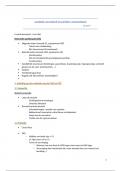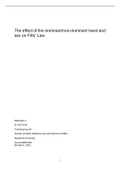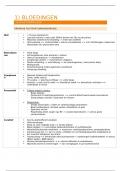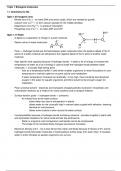Lumbale wervelzuil en perifeer zenuwstelsel
De geyter
(+word document -> ter info)
Relevantie podoloog bij LWZ
Stijgende keten (oorzaak OL, symptomen LWZ)
- Tekort aan schokbreking
- BLV (structureel of functioneel)
Dalende keten (oorzaak LWZ, symptomen OL)
- Krachtsverlies
- Pijn of veranderende gevoelsgewaarwording
- Functieverlies
Sensibiliteit stoornissen (tintelingen, paresthesie, branderige pijn, hypergevoelig, verdoofd
gevoel aan de voet, krachtsverlies, …)
Scoliose
Trendlenbrugse drop
Rugpijn zelf (discusletsel, facetairlijden)
…
1. Inleiding op de evaluatie van de LWZ en PZS
1.1 Inspectie
Statische inspectie
Lateraal aanzicht
- Fysiologische krommingen
- Onderste lidmaten
Dorsaal/ventraal aanzicht
- Schouderhoogte + positie van scapulae
- Bekkenstand (symmetrie crista iliacae en bilplooien)
- Stand van de wervelzuil
- Trofiek van de rugmusculatuur
1.2 Palpatie
Crista iliaca
SIPS
- Midden van beide sips = S1
- L5: ligt tussen L4 en S1
- Torsie of verwringing
͠ Wanneer aan ene kant de SIPS hoger staat maar de SIAS lager
͠ Verwringing kan functioneel zijn, maar meestal door een trauma (val,
bevalling,..)
1
, SIAS
- Meest uitstekende punt vooraan
- Als alles langs ene kant hoger staat = lateroflexie
- Als voorkant hoger (SIAS) en achterkant (SIPS) lager (of omgekeerd) = verwringing,
torsie
Processi spinosi: L1, L2, L3, L4, L5 en S1
- L4: neem hoogste punten van beide crista iliacae -> midden -> L4
- L4 naar boven: L3, L2, L1 -> L1 en 2 zijn kleiner dan de andere processi
- L5: ligt tussen L4 en S1
- S1: zoek SIPS -> midden -> S1
TLO (toracolumbaleoverhang)
- Belangrijk plaats voor rotatie
͠ Rotatie vindt plaats thoracaal tussen bovenste deel thorax en armzwaai.
͠ TLO staat boven L1
SIG (sacro-iliacaal gewricht)
- Overgang tussen sacrum en ilium
- Kan je niet palperen
- Moet je visualiseren
Os sacrum
- Start thv S1
1.3 ROM testen LWZ
Flexie
- 40-60° (vooral lumbaal)
- Flexie geeft
͠ Druk op anterieur deel van de discus
͠ Rek op posterieure ligamenten en musculatuur
͠ Rek op dura mater en zenuwwortels L4-S2
- TEST: Schöber index
͠ Kijken of er voldoende flexie is
͠ PT staat rechtop
͠ Proc. Spin. L5 aanduiden + 10 cm hoger
͠ Pt met gestrekte kniëen naar voor laten buigen
͠ Afstand tussen 2 streepjes meten -> 15 cm of meer = voldoende mobiliteit in
flexie (voldoende ROM)
- Beoordeling:
͠ Bekijke de curve ( soms in traject van ROM iets omzeilen -> vb: even naar
links of rechts draaien om iets te ontwijken.
͠ Is er pijnreproductie? Herkenbare pijn?
͠ Waar gebeurd de beweging
Extensie
- 20-35° (vooral lumbaal)
2
De geyter
(+word document -> ter info)
Relevantie podoloog bij LWZ
Stijgende keten (oorzaak OL, symptomen LWZ)
- Tekort aan schokbreking
- BLV (structureel of functioneel)
Dalende keten (oorzaak LWZ, symptomen OL)
- Krachtsverlies
- Pijn of veranderende gevoelsgewaarwording
- Functieverlies
Sensibiliteit stoornissen (tintelingen, paresthesie, branderige pijn, hypergevoelig, verdoofd
gevoel aan de voet, krachtsverlies, …)
Scoliose
Trendlenbrugse drop
Rugpijn zelf (discusletsel, facetairlijden)
…
1. Inleiding op de evaluatie van de LWZ en PZS
1.1 Inspectie
Statische inspectie
Lateraal aanzicht
- Fysiologische krommingen
- Onderste lidmaten
Dorsaal/ventraal aanzicht
- Schouderhoogte + positie van scapulae
- Bekkenstand (symmetrie crista iliacae en bilplooien)
- Stand van de wervelzuil
- Trofiek van de rugmusculatuur
1.2 Palpatie
Crista iliaca
SIPS
- Midden van beide sips = S1
- L5: ligt tussen L4 en S1
- Torsie of verwringing
͠ Wanneer aan ene kant de SIPS hoger staat maar de SIAS lager
͠ Verwringing kan functioneel zijn, maar meestal door een trauma (val,
bevalling,..)
1
, SIAS
- Meest uitstekende punt vooraan
- Als alles langs ene kant hoger staat = lateroflexie
- Als voorkant hoger (SIAS) en achterkant (SIPS) lager (of omgekeerd) = verwringing,
torsie
Processi spinosi: L1, L2, L3, L4, L5 en S1
- L4: neem hoogste punten van beide crista iliacae -> midden -> L4
- L4 naar boven: L3, L2, L1 -> L1 en 2 zijn kleiner dan de andere processi
- L5: ligt tussen L4 en S1
- S1: zoek SIPS -> midden -> S1
TLO (toracolumbaleoverhang)
- Belangrijk plaats voor rotatie
͠ Rotatie vindt plaats thoracaal tussen bovenste deel thorax en armzwaai.
͠ TLO staat boven L1
SIG (sacro-iliacaal gewricht)
- Overgang tussen sacrum en ilium
- Kan je niet palperen
- Moet je visualiseren
Os sacrum
- Start thv S1
1.3 ROM testen LWZ
Flexie
- 40-60° (vooral lumbaal)
- Flexie geeft
͠ Druk op anterieur deel van de discus
͠ Rek op posterieure ligamenten en musculatuur
͠ Rek op dura mater en zenuwwortels L4-S2
- TEST: Schöber index
͠ Kijken of er voldoende flexie is
͠ PT staat rechtop
͠ Proc. Spin. L5 aanduiden + 10 cm hoger
͠ Pt met gestrekte kniëen naar voor laten buigen
͠ Afstand tussen 2 streepjes meten -> 15 cm of meer = voldoende mobiliteit in
flexie (voldoende ROM)
- Beoordeling:
͠ Bekijke de curve ( soms in traject van ROM iets omzeilen -> vb: even naar
links of rechts draaien om iets te ontwijken.
͠ Is er pijnreproductie? Herkenbare pijn?
͠ Waar gebeurd de beweging
Extensie
- 20-35° (vooral lumbaal)
2





